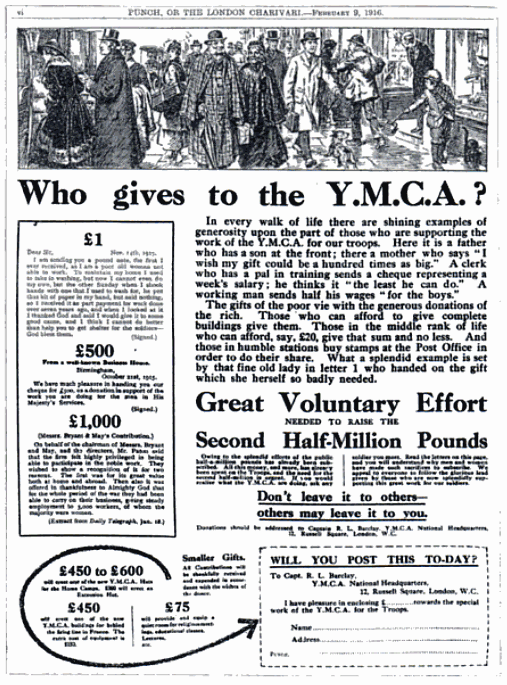A lesson from history
When I was Head of Fundraising at YMCA England, I had a copy of this ad on my wall.
You'll see from the header that it appeared in Punch in the middle of the First World War (the 93rd anniversary of its publication was last Monday).
I hadn't seen it in years, but I was digging out some old papers when I luckily stumbled upon it. Reading it again after at least a decade, I'm still really impressed by its approach.
The whole ad is aimed at driving response. It doesn't do this by wasting expensive space recounting what the YMCA was doing for the troops. The Y understood that people knew about it's work and the need. Instead they chose to focus on the reader.
As well as offering donors a fantastic means of self-definition, it made giving personal. It was a chance to show support for friends and family at the front.
Using stories of clerks giving a week's pay, to a "fine old lady...who handed on a gift which she herself so badly needed", they made it clear that everyone was expected to give – no matter what their background or circumstance.
The only question was how much?
The gift prompts are absolutely huge. £1 was the best part of half a week's wages for a skilled worker in 1916.
Those in the "middle rank of life" are asked for £20 "and no less" (The Chief Inspector of Railways was only on about £23 a week).
Complete buildings are expected from those who can afford to give them.
Other prompts were from £75 right up to £600. Each was justified with an example of what the gift might be used for. And the arrow device is pretty good at directing you to the coupon (which is coded for response analysis).
I imagine it generated a cracking average gift.
I even like the reference to the "second half-million". If you gave to the first half, you were probably on the mailing file. This ad is aimed at recruiting new donors. They want to remind you that others have done their bit. Now it's your turn (And if you do happen to see it after you've donated once already, this is the second half-million. It's time to give again!).
And finally we have a great call to action...
"Don't leave it to others – others may leave it to you."
It's to the point, people focussed and doesn't apologise for asking.
All I need now is a time machine to go back and try and employ the team that put it together.
Tags In
The Essentials

Crack the Code to Regular Giving: Insights, Strategies, and a Special Giveaway!

‘Tis Halloween. Keep to the light and beware the Four Fundraisers of the Apocalypse!

Why do people give? The Donor Participation Project with Louis Diez.

A guide to fundraising on the back of a postcard

What does the latest research tell us about the state of fundraising?






